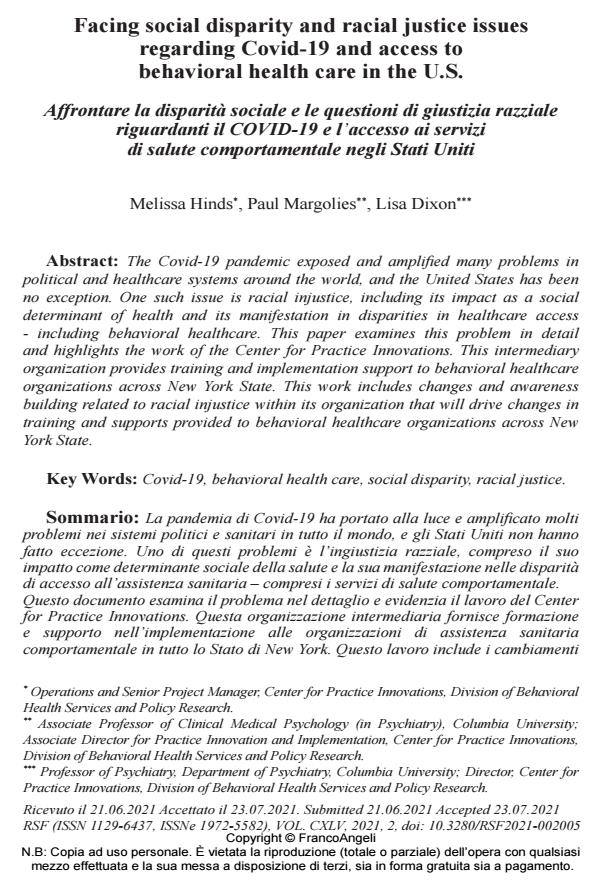Facing social disparity and racial justice issues regarding Covid-19 and access to behavioral health care in the U.S.
Titolo Rivista RIVISTA SPERIMENTALE DI FRENIATRIA
Autori/Curatori Melissa Hinds, Paul Margolies, Lisa Dixon
Anno di pubblicazione 2021 Fascicolo 2021/2
Lingua Inglese Numero pagine 12 P. 53-64 Dimensione file 162 KB
DOI 10.3280/RSF2021-002005
Il DOI è il codice a barre della proprietà intellettuale: per saperne di più
clicca qui
Qui sotto puoi vedere in anteprima la prima pagina di questo articolo.
Se questo articolo ti interessa, lo puoi acquistare (e scaricare in formato pdf) seguendo le facili indicazioni per acquistare il download credit. Acquista Download Credits per scaricare questo Articolo in formato PDF

FrancoAngeli è membro della Publishers International Linking Association, Inc (PILA)associazione indipendente e non profit per facilitare (attraverso i servizi tecnologici implementati da CrossRef.org) l’accesso degli studiosi ai contenuti digitali nelle pubblicazioni professionali e scientifiche
The Covid-19 pandemic exposed and amplified many problems in political and healthcare systems around the world, and the United States has been no exception. One such issue is racial injustice, including its impact as a social determinant of health and its manifestation in disparities in healthcare access - including behavioral healthcare. This paper examines this problem in detail and highlights the work of the Center for Practice Innovations. This intermediary organization provides training and implementation support to behavioral healthcare organizations across New York State. This work includes changes and awareness building related to racial injustice within its organization that will drive changes in training and supports provided to behavioral healthcare organizations across New York State.
La pandemia di Covid-19 ha portato alla luce e amplificato molti problemi nei sistemi politici e sanitari in tutto il mondo, e gli Stati Uniti non hanno fatto eccezione. Uno di questi problemi è lʼingiustizia razziale, compreso il suo impatto come determinante sociale della salute e la sua manifestazione nelle disparità di accesso allʼassistenza sanitaria - compresi i servizi di salute comportamentale. Questo documento esamina il problema nel dettaglio e evidenzia il lavoro del Center for Practice Innovations. Questa organizzazione intermediaria fornisce formazione e supporto nellʼimplementazione alle organizzazioni di assistenza sanitaria comportamentale in tutto lo Stato di New York. Questo lavoro include i cambiamenti e il consolidamento della consapevolezza relativi allʼingiustizia razziale allʼinterno della sua organizzazione, che guideranno i cambiamenti nella formazione e nei supporti forniti alle organizzazioni e servizi di salute comportamentale in tutto lo Stato di New York. .
Parole chiave:Covid-19, servizi di salute comportamentale, disparità sociale, giustizia razziale
Melissa Hinds, Paul Margolies, Lisa Dixon, Facing social disparity and racial justice issues regarding Covid-19 and access to behavioral health care in the U.S. in "RIVISTA SPERIMENTALE DI FRENIATRIA" 2/2021, pp 53-64, DOI: 10.3280/RSF2021-002005